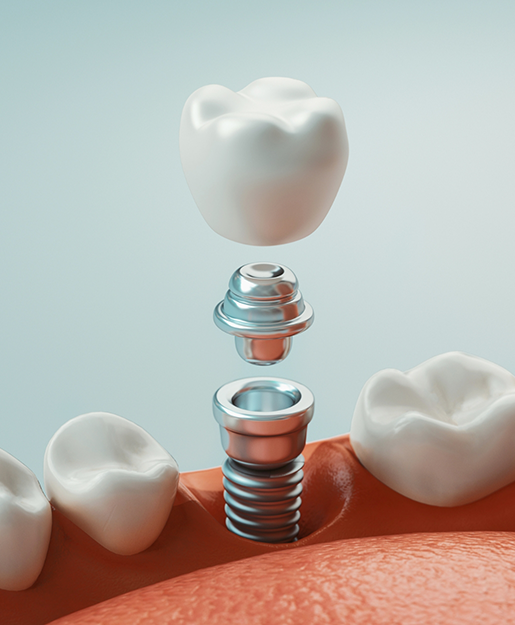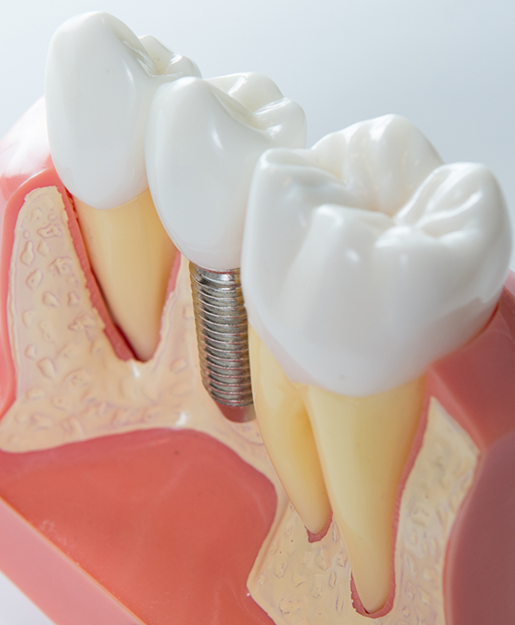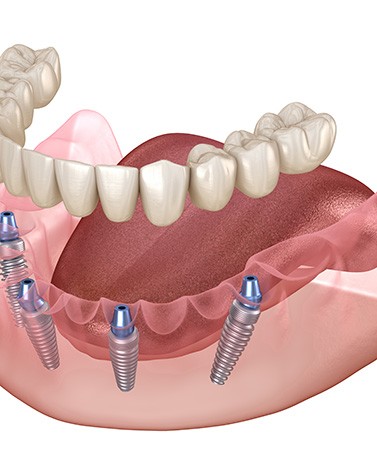Dental Implants Bullard
Replace Missing Teeth With Ease
When permanent teeth are lost, regardless of the reason or number of teeth, dental implants can offer patients an effective way of restoring their whole smile. They are superior to other choices because they are solid, secure, and aesthetic. After nearly 35 years of use, they have a 90-95% proven success rate in appropriately chosen cases. Dr. Tad Morgan provides dental implant restorations (the dental crowns and other prosthetics that complete the implant process) at our dental office. If you’re missing a single tooth or a complete row of teeth, call our office to schedule a consultation appointment with us for dental implants in Bullard.
Why Choose Tad Morgan, DDS for Dental Implants?
- Insurance-Friendly Practice with Financing Options
- Proudly Partnered with Renowned Local Implant Experts
- Beautiful, Highly-Customized, Natural-Looking Restorations
What Is a Dental Implant?

Dental implants are posts inserted into the gum line that will mimic the lost roots of your teeth. Unlike other tooth replacement options that only restore the parts of teeth you can see when you smile, implants allow our team to completely reconstruct your smile from the roots up. This makes dental implants a much more natural-looking, feeling, and functioning restoration option.
The 4-Step Dental Implant Process

The process for receiving dental implants is much longer and more complex than that of traditional dentures, but when you consider all of the benefits that this solution has to offer, it becomes obvious that the wait is very much worth it. While every treatment does differ, generally speaking, the dental implant process can often be categorized into four key steps. Here’s a closer look at each one:
Initial Dental Implant Consultation

The first step in the dental implant process is always a consultation with Dr. Morgan here at our office. Keep in mind that some patients end up needing preliminary procedures, such as a bone graft, tooth extraction, or gum disease treatment, before they’re able to receive dental implants. In any case, during this appointment, Dr. Morgan and our team will review our findings with you and begin planning your treatment accordingly.
Dental Implant Surgery

Our office is proudly partnered with some of the best dental implant specialists in the region, meaning that your dental implant surgery will be performed by a highly skilled and trustworthy team. The actual dental implant surgery is surprisingly straightforward. Your mouth is numbed before small incisions are made into the gum tissue to access the jawbone. The implant posts are then placed at precise angles and locations before the gums are closed up and protective caps are placed over the posts to protect them during the healing process.
Dental Implant Osseointegration & Abutment

Over the next three to six months, your dental implant posts will fuse with your jawbone tissue through a process called osseointegration. This process is crucial and is the reason dental implants are able to last for so long without becoming loose or unstable. It also prevents further bone loss in the jaw. After osseointegration has occurred, it’s time to receive your abutments, which are the connector pieces that sit on top of your implant posts and secure your restoration(s).
Delivery of Dental Implant Restoration(s)

After your abutments have been placed, it’s finally time to receive your brand-new teeth, which come in the form of a custom-made dental restoration depending on your specific needs. No matter if it’s a crown, bridge, or implant-retained denture, it’ll go on top of the posts, and we’ll double-check that everything looks and feels as it should. From there, you’re all set to head out into the world and begin enjoying your complete smile!
The Benefits of Dental Implants

People choose dental implants for a variety of reasons, including:
- Dental implants offer flexibility, replacing a single tooth, several teeth at once, or even all of your teeth.
- Because dental implants anchor your replacement teeth in place, there's no fear of slipping, shifting, or clicking.
- They're designed to function and feel just like your own teeth.
- They return your ability to eat a wide variety of foods.
- They don't require any modification of remaining teeth.
- They prevent bone loss.
Who Dental Implants Can Help

Many experts consider dental implants the gold standard of replacement teeth because of their many unique advantages. However, that doesn’t necessarily mean you’re automatically a good candidate for this procedure.
Before proceeding, you must consult Dr. Morgan to ensure this is the best way to restore your smile based on your individual circumstances. Continue reading to learn more about who can potentially benefit from this treatment, and please don’t hesitate to contact us for additional information to schedule an appointment.
Who Is a Good Candidate for Dental Implants?

Almost anyone who is missing teeth can consider getting dental implants, but there are specific criteria our team looks for in ideal candidates, including:
- Good general health. This service involves oral surgery, so we’ll update your medical history and list any current medications or supplements you take to avoid doing anything that might cause an adverse reaction.
- Have a healthy smile. Tooth decay and gum disease can contribute to damaged or failed implants, so we’ll need to treat those first.
- Sufficient jawbone density. Your jawbone thins after tooth loss, and if it has become too frail, it might require an additional bone graft procedure to support your chosen restorations.
Choosing the right restoration for your new implant(s) is a crucial decision, and Dr. Morgan will work with you to determine the ideal solution based on several factors, including your current level of oral health, the number of teeth that need replacement, and your own personal preferences.
Missing One Tooth

A single support post can be placed in your jaw, which eventually fuses with the bone to function as a sturdy, standalone structure. This is usually capped with a dental crown made from resilient ceramic that’s customized to match your natural enamel. The tooth-shaped cover is also durable enough to resist additional damage or discoloration and can potentially last 10 to 15+ years if cared for correctly.
Missing Multiple Teeth

If you have a more expansive space in your smile caused by multiple teeth that fell out consecutively in a row, then you might be an ideal candidate for an implant bridge. This involves placing two rods into your jaw on either side of the gap. These will eventually anchor a specially designed prosthetic containing the correct number of pontics (artificial teeth) between two dental crowns, which will be attached to your implants. These appliances have both fixed and removable varieties.
Missing All Teeth

If you’re missing most or all of your natural teeth, our team might recommend All-on-4 implant dentures to replace them. This reconstructive treatment involves strategically arranging four support poles in your jaw (instead of four to eight for standard implant dentures), which will eventually anchor specially designed teeth that aren’t intended to be removed. Like crowns and bridges, these restorations are customized to resemble the color, size, and shape of your natural teeth for resilient, lifelike results.
Learn More About Implant Dentures
How Much Do Dental Implants Cost?

The cost of dental implants depends in large part on the individual’s plan. A big part of your treatment consultation appointment will be spent walking you through each step of your treatment plan, offering estimates of the out-of-pocket costs for each step of the process, and working with you to budget for your tooth replacement. We are happy to file dental insurance claims to maximize your benefits whenever possible. Our office accepts payments through CareCredit and other third-party financiers that provide low and no-interest financing for medical and dental treatments.
How Much Do Dental Implants Cost?

There is no easy answer to how much you can expect to pay because the amount is determined by your individual treatment plan. As a result, what a friend or loved one paid for their dental implants will not be the same for you. There are various factors that are considered, such as:
Number of Teeth: The more posts and abutments you need, the more the procedure will cost. Although a single unit is less expensive than an implant-supported oral appliance, it is more cost-effective to replace multiple teeth with one than to treat each tooth individually.
Imaging: To assess your oral health and to determine the location of your posts, Dr. Morgan will need to take X-rays and a CT scan.
Additional Procedures: It is common to need additional procedures before having your posts placed, like tooth extractions, bone grafting, or a sinus lift.
Sedation and Anesthesia: Sedation or anesthesia are both often used during your surgery to ensure your comfort.
Materials: There are discounted materials; however, they may not offer the same durability as those that are more expensive.
Restoration: Your treatment is broken into two main phases: the placement of your posts and the delivery of the restoration. Each has separate costs.
Paying for Your Smile

Do not let the cost of dental implants deter you from replacing your missing teeth. There are several options to pay for your new smile. Often, your dental insurance will cover certain aspects of the procedure. Although it will not pay for it in full, it can help to lower the cost of the restorations, CT scan, or any additional procedures until you reach your annual limit.
To pay for any remaining balance, you can use third-party financing with CareCredit. After you are approved, you are given the funds to pay for the treatment. You then repay the balance using a payment schedule that accommodates your budget.
Maintaining & Caring for Your Dental Implants

Dental implants are amazing prosthetic appliances that may keep your smile healthy and complete for life if you take excellent care of them. Neglecting to properly care for your implants will lead to destructive oral infections that can cause them to fail and need replacement, but a few simple habits will help you keep your restorations safe, comfortable, beautiful, and functional for years to come. Here’s a quick guide to the best ways to care for your implants from the team at Dr. Tad Morgan’s dental office.
Make Oral Hygiene a Priority

While dental implants are immune to cavities since they are not made from natural enamel, the gum and bone tissues supporting them can still be destroyed by oral infections. To prevent this, be sure to clean your teeth and implants each day by brushing, flossing, and using antibacterial mouthwash.
Eat a Healthy Diet

Dental implants are strong enough to exert maximum chewing power and allow patients to eat whatever they like. However, it’s crucial to enjoy a balanced diet that provides plenty of vitamins, minerals, and protein to keep your implants and the rest of your body healthy. Foods and beverages that are excessively sugary or acidic, on the other hand, will promote oral infections.
Break Bad Habits

Tobacco use in any form is utterly horrible for your oral health because it hinders healthy blood flow and exhausts your gums and other soft tissues, so it’s best to quit smoking, vaping, dipping, or chewing before receiving implants. It’s also important to abstain from using your natural and artificial teeth to open packages or bottles.
Protect Your Dental Implants

Dental implants are amazingly strong and durable, but they are not invincible and can be damaged by excessive force. Dr. Morgan will be happy to fit you with an athletic sportsguard designed to protect your teeth from injuries due to blows and falls or a customized nightguard that will prevent grinding. Personalized appliances from our office will deliver protection far superior to that offered by any similar store-bought products.
Schedule Regular Dental Checkups

Visit Dr. Morgan’s office in Bullard for a routine checkup every six months. These appointments will allow our team to monitor your oral health, thoroughly clean your mouth, detect and address infections and other problems in their early stages, and recommend better oral hygiene habits for you to implement at home. This is a crucial part of preventing serious oral health complications that can lead to early implant failure and make costly restorative treatments necessary.
Complete Your Smile Today!

You can invest in your oral health and your quality of life using a long-term solution to treat tooth loss. Dr. Morgan discusses your treatment plan and the associated costs. To keep your treatment affordable, he will maximize your dental coverage and explain your payment options.
Stop living with an incomplete smile. Contact our office today to schedule your consultation for dental implants.
Dental Implant FAQs
How Long Do Dental Implants Last?
Dental implants are unlike any other replacement option because they are designed to last for a lifetime as long as they are cared for properly. The titanium that dental implants are made of is biocompatible, allowing them to fuse to your jawbone in a process called osseointegration, becoming a permanent part of your body. Titanium is incredibly durable, which is the main reason why your dental implants can last for decades upon decades.
Why Should I Choose Dental Implants?
Dental implants have a success rate of over 95%, and they come with a number of unique benefits. However, where they truly set themselves apart from other options is that they’re the only replacement that restores the entire tooth from the roots up. This provides the most natural feeling smile, but it also keeps your jawbone healthy. Dental implants stimulate the jaw to prevent it from deteriorating after tooth loss. A healthy jawbone means additional lost teeth are less likely, and you’ll also maintain a fuller, youthful facial appearance.
Are Dental Implants Right for Me?
Dental implants have become the premier option for tooth replacement because of their many benefits. However, you may be wondering whether or not this is the right solution for you. The best way to know is to come into our office for a consultation. Dr. Morgan will carefully examine your smile, the number of teeth you’re missing, and also check for any preexisting dental issues. From there, he will be able to develop a personalized treatment plan
How Should I Maintain My Dental Implants?
One of the most significant benefits of dental implants in Bullard is that they look, feel, and function like your natural smile. For these reasons, caring for your implants is easy! Just brush twice a day and floss once a day to keep your smile healthy and clean. A good at-home oral healthcare routine combined with regular visits to our office for checkups and cleanings will ensure that you can continue to enjoy a strong, beautiful set of teeth. If you still have questions, please don’t hesitate to contact our office to speak with one of our friendly team members!
I Need a Checkup & Cleaning I Need a Dentist for My Child I Want to Enhance My Smile I Need Tongue-Tie Treatment I Have Jaw Pain/Headaches I Have Sleep Apnea I Have a Cavity/Broken Tooth I'm Missing One or More Teeth I Have a Dental Emergency I Have Sensitive/Bleeding Gums I'm Scared of the Dentist View Our Services









